Six Degrees of Separation is hosted by Kate at books are my favourite and best. This will be my second month of taking part. Each month Kate chooses a book as a starting point for a chain of six books, each one linked in some way to the book before. Everyone’s chains are so different! Mine this month has certainly surprised me. I’ve tried to go with the first book that came to mind as I went along. My mind certainly works in mysterious ways!
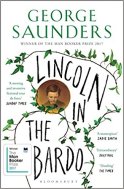 This month Kate chose Lincoln in the Bardo by George Saunders as the book to kick things off. This book won last year’s Man Booker Prize so there’s been a lot of publicity and discussion around it. It relates the story of a single night during which President Lincoln, grief-stricken, mourns the loss of his young son who has been laid to rest in a Georgetown cemetery. This is a book I do want to read, though I admit to feeling a little apprehensive. The subject matter sounds difficult and I know the novel has broken new ground in its style and composition. I’m not sure how easy it will be to read.
This month Kate chose Lincoln in the Bardo by George Saunders as the book to kick things off. This book won last year’s Man Booker Prize so there’s been a lot of publicity and discussion around it. It relates the story of a single night during which President Lincoln, grief-stricken, mourns the loss of his young son who has been laid to rest in a Georgetown cemetery. This is a book I do want to read, though I admit to feeling a little apprehensive. The subject matter sounds difficult and I know the novel has broken new ground in its style and composition. I’m not sure how easy it will be to read.
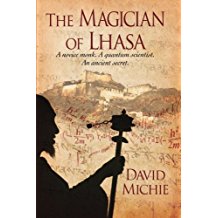 Anyway, where does it lead me? Bardo is a term used in Tibetan Buddhism. That immediately led me away from the controversy and my own doubts about our opening book and into thoughts about Buddhism. I remembered The Magician of Lhasa by David Mitchie. Following a much more familiar style, the book tells two stories: that of a young Buddhist monk in 1959 fleeing the Tibetan Uprising of that year, and a modern-day scientist who faces his own crises as his life takes unexpected and baffling turns.
Anyway, where does it lead me? Bardo is a term used in Tibetan Buddhism. That immediately led me away from the controversy and my own doubts about our opening book and into thoughts about Buddhism. I remembered The Magician of Lhasa by David Mitchie. Following a much more familiar style, the book tells two stories: that of a young Buddhist monk in 1959 fleeing the Tibetan Uprising of that year, and a modern-day scientist who faces his own crises as his life takes unexpected and baffling turns.
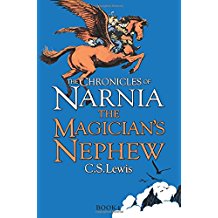 It was an easy jump from one magician to another. For the third book in my chain I leapt smoothly to The Magician’s Nephew by C S Lewis. I adored The Lion, The Witch and The Wardrobe as a child but I don’t recall reading any of the others in the Narnia series. I now know that The Magician’s Nephew is the first in the sequence and I’m keen to learn how Narnia and the Wardrobe came into being. (Another book to be read!) The Magician’s Nephew links back to The Magician of Lhasa through the obvious shared word in the title but
It was an easy jump from one magician to another. For the third book in my chain I leapt smoothly to The Magician’s Nephew by C S Lewis. I adored The Lion, The Witch and The Wardrobe as a child but I don’t recall reading any of the others in the Narnia series. I now know that The Magician’s Nephew is the first in the sequence and I’m keen to learn how Narnia and the Wardrobe came into being. (Another book to be read!) The Magician’s Nephew links back to The Magician of Lhasa through the obvious shared word in the title but 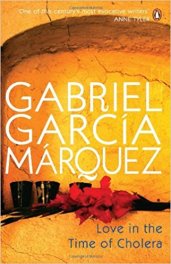 the next book to bubble up, Love in the Time of Cholera by Gabriel Garcia Marquez, is much more of a stretch. This book tells the story of Fermina and Florentino who require a lifetime apart before finally coming together to enjoy their love for each other. Again though, the connection began with the word ‘magic’. I associate Garcia Marquez with magical realism, a genre which fascinates me. Although Love in the Time of Cholera really doesn’t come under the banner of magical realism (I ought to have chosen One Hundred Years of Solitude for that), like Lewis, Garcia Marquez explores allegory and fantasy and experiments with our concept of reality.
the next book to bubble up, Love in the Time of Cholera by Gabriel Garcia Marquez, is much more of a stretch. This book tells the story of Fermina and Florentino who require a lifetime apart before finally coming together to enjoy their love for each other. Again though, the connection began with the word ‘magic’. I associate Garcia Marquez with magical realism, a genre which fascinates me. Although Love in the Time of Cholera really doesn’t come under the banner of magical realism (I ought to have chosen One Hundred Years of Solitude for that), like Lewis, Garcia Marquez explores allegory and fantasy and experiments with our concept of reality.
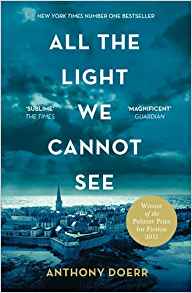 Love in the Time of Cholera is a book I adore and I have such vivid memories of when I first read the opening pages and discovered the depth of beauty in the language within the covers. I can’t think of Garcia Marquez without thinking of this book. That was many years ago, but it brings to mind a far more recent but equally vivid experience when I began reading All the Light We Cannot See by Anthony Doerr which becomes the next book in the chain. A Pulitzer Prize winner this time, and like Lincoln in the Bardo, another book I had some concerns about reading – concerns which had totally vanished before I’d reached the bottom of the first page. This is a novel of growing up through the Second World War and opens in Paris. It is told from the perspectives of Marie-Laure, who loses her sight in 1934 at the age of six, and Werner, an orphaned German boy, selected for elite training by the Nazis because of his remarkable gift for radio mechanics. As in The Magician of Lhasa their lives ultimately connect and their stories had me gripped, but like Love in the Time of Cholera, this will be a book that stays with me above all for the beauty of the language. All the Light We Cannot See is written in the present tense and in very short chapters which some people have found frustrating. I found myself thinking again of some of the complexities and controversies I’ve read surrounding the style of Lincoln in the Bardo.
Love in the Time of Cholera is a book I adore and I have such vivid memories of when I first read the opening pages and discovered the depth of beauty in the language within the covers. I can’t think of Garcia Marquez without thinking of this book. That was many years ago, but it brings to mind a far more recent but equally vivid experience when I began reading All the Light We Cannot See by Anthony Doerr which becomes the next book in the chain. A Pulitzer Prize winner this time, and like Lincoln in the Bardo, another book I had some concerns about reading – concerns which had totally vanished before I’d reached the bottom of the first page. This is a novel of growing up through the Second World War and opens in Paris. It is told from the perspectives of Marie-Laure, who loses her sight in 1934 at the age of six, and Werner, an orphaned German boy, selected for elite training by the Nazis because of his remarkable gift for radio mechanics. As in The Magician of Lhasa their lives ultimately connect and their stories had me gripped, but like Love in the Time of Cholera, this will be a book that stays with me above all for the beauty of the language. All the Light We Cannot See is written in the present tense and in very short chapters which some people have found frustrating. I found myself thinking again of some of the complexities and controversies I’ve read surrounding the style of Lincoln in the Bardo.
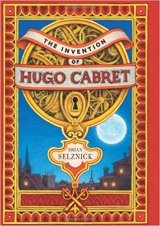 Next comes a book I’ve owned for some time and plan to read very soon: The Invention of Hugo Cabret by Brian Selznick. There are almost too many connections to mention. Hugo is an orphan, as was Werner, and eventually Marie-Laure in my previous choice. Hugo lives in Paris (in the walls of a train station) which is where Marie-Laure lives at the start of her story. (Though she didn’t live in the walls of a train station.) Like Werner, Hugo has a great talent, though his is for fixing clocks rather than radios. Hugo’s father had worked in a Paris museum as did Marie-Laure’s father. (He had a talent for locks and puzzles.) And the book itself breaks new ground in its composition. Selznick describes it as “not exactly a novel, not quite a picture book, not really a graphic novel, or a flip book or a movie, but a combination of all these things”. Like several others in my chain it is a prize-winner, having won the 2008 Caldecott Medal. It was the first novel to do so, as the Caldecott Medal is for picture books. The book also became a wonderful film directed by Martin Scorsese.
Next comes a book I’ve owned for some time and plan to read very soon: The Invention of Hugo Cabret by Brian Selznick. There are almost too many connections to mention. Hugo is an orphan, as was Werner, and eventually Marie-Laure in my previous choice. Hugo lives in Paris (in the walls of a train station) which is where Marie-Laure lives at the start of her story. (Though she didn’t live in the walls of a train station.) Like Werner, Hugo has a great talent, though his is for fixing clocks rather than radios. Hugo’s father had worked in a Paris museum as did Marie-Laure’s father. (He had a talent for locks and puzzles.) And the book itself breaks new ground in its composition. Selznick describes it as “not exactly a novel, not quite a picture book, not really a graphic novel, or a flip book or a movie, but a combination of all these things”. Like several others in my chain it is a prize-winner, having won the 2008 Caldecott Medal. It was the first novel to do so, as the Caldecott Medal is for picture books. The book also became a wonderful film directed by Martin Scorsese.
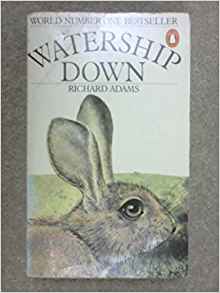 Children have featured in a number of my choices so it seems appropropriate to move from the Caldecott Medal to the Carnegie Medal: “the UK’s oldest and most prestigious book award for children’s writing”. In 1972 the award was won by a book which featured no children – no humans at all really. Watership Down by Richard Adams is a fantasy novel in which Fiver, the rabbit, leads his companions on the search for a new home. This book also spawned a film, as well as a tv series and a no. 1 song for Art Garfunkel. It sends me back again to The Magician’s Nephew, with its fantasy world filled with its own myth and culture and possible religious symbolism. (Adams denies this.)
Children have featured in a number of my choices so it seems appropropriate to move from the Caldecott Medal to the Carnegie Medal: “the UK’s oldest and most prestigious book award for children’s writing”. In 1972 the award was won by a book which featured no children – no humans at all really. Watership Down by Richard Adams is a fantasy novel in which Fiver, the rabbit, leads his companions on the search for a new home. This book also spawned a film, as well as a tv series and a no. 1 song for Art Garfunkel. It sends me back again to The Magician’s Nephew, with its fantasy world filled with its own myth and culture and possible religious symbolism. (Adams denies this.)
So, my chain has encompassed prize-winners and books which have pushed the boundaries in style and composition. I’ve dabbled a little in religion and in magic, spent some time in South America and Paris and passed the time of day with clocks and locks and radios and rabbits. And I’ve explored several imaginary worlds. A number of my choices have featured children as protagonists; some have been books written as much for children as for adults. I’ve watched lives unfold from the very young to the very old – and beyond. What a world we are offered in the company of books!
Next month’s starter for ten is The Beauty Myth by Naomi Wolf.

Yes, I want to read Lincoln in the Bardo too, though like you, I am slightly apprehensive. As a child, I loved the Narnia books, and we saw the truly stunning production of The Lion, the Witch and the Wardrobe at the Leeds Playhouse last month. If it is revived elsewhere, and it might be, it’s a wonderful night at the theatre. All the Light I Cannot See? Yes! A memorable book. All the rest will go on my long ‘to read’ list. Except for Watership Down. I enjoyed it as a child, but not to the extent of wanting to revisit it. So much to read …..
LikeLiked by 1 person
I’ll look out for that production, Margaret, thank you. And I agree about Watership Down. I regularly read/reread children’s books but WD I can resist. Phew!
LikeLiked by 1 person
Fascinating
LikeLiked by 1 person
Ah, you’re speaking to a convert here, as I was a big Narnia fan! And I also recommend the film Hugo Cabret – my children and I loved it, although I haven’t read the book to compare.
LikeLiked by 1 person
Hugo is a wonderful film isn’t it! And a rare example of where I ‘ve been motivated to buy the book on the strength of the film. Maybe that’s why I haven’t read it yet though: I don’t want to be disappointed by either book or film. As for Narnia – I’m sure I had the entire set as a child yet I only remember reading the one book. I can see a revisit looming…
LikeLike
I think this is my favourite of all the chains I’ve seen so far this month! You’ve included two books that I loved as a child – Watership Down and The Magician’s Nephew. I haven’t read any of your others, but I am interested in reading Love in the Time of Cholera and All the Light We Cannot See.
LikeLiked by 1 person
Oh thank you Helen! I too, loved Watership Down but have no desire to revisit it. I remember trying to read his next book, Shardik, and it did nothing for me. WD was very much a moment in time for me. Love in the Time of Cholera and All the Light We Cannot See are both worth a try. LitToC is one of those slow, rambling books in no hurry to release its story. I found AtLWCS astonishing and I hope I’ll get a review written soon. I do hope you give them a try 🙂
LikeLike
A fascinating selection. The only one I’ve read is Watership Down, many years ago, that book -and film – had quite an impact at the time.
LikeLiked by 1 person
It had quite an impact on me too, Andrea 🙂
LikeLiked by 1 person
I have read a post somewhere else on the same subject, but your take on the subject set an entirely different train of thoughts. I believe George Saunders will have provided me with enough experimentations for a life time. To be sure, he is a denizen of both my bookshelf and Kindle, but he will have to wait in the sidetrack like a provincial shuttle service as the long distance express trains thunder past, such as Love in the Time of Cholera. Again, the minimalist, chopped off and denuded prose of the supra-modern writers turn me off big time. I’d rather read Catch 22 one more time…
LikeLiked by 1 person
Love the metaphors, Uma. With such a plethora of titles to choose from, it’s a very good thing we all have our individual preferences 🙂
LikeLiked by 1 person
Very interesting chain! I’ve not read any of the books except the Hugo Cabret book. I remember that one so well. I was still working at the library when it came out and we were all fascinated with the way the story was told. So unique and the fact that it won the Caldecott Medal for 2008 was wonderful. Anyway, great memories. Hope you enjoy it!
LikeLiked by 1 person
I’m sure I will, Kay. Thank you!
LikeLike
This is such an interesting, different sort of challenge–I love reading your connections, although I’ve only read Watership Down and Love in the Time of Cholera, both a LONG time ago. I do have All the Light so I’ll think of you when I read it!
LikeLiked by 1 person
I hope you enjoy All the Light as much as I did, Kerry 🙂
LikeLike
This is fun – love your choices! 🙂
LikeLiked by 1 person
It’s a lot of fun to do. Thanks Liz! 🙂
LikeLiked by 1 person
I have read Love in the Time of Cholera and really enjoyed reading it. Although the book was a bit slower than my usual reads still I like Gabo’s writing style. Also, this meme sounds very interesting.
LikeLiked by 1 person
It’s a fun meme, Mini. I enjoy thinking it through. It’s how different each person’s chain of books becomes 🙂
LikeLiked by 1 person
Exactly. This is the best part of this meme. I want to try this too but I am worried that I might not come up with anything. 😅
LikeLiked by 1 person
I’m sure you would! It can go in any direction you choose and doesn’t have to be limited to books you’ve read (or books you’ve liked). And if you find you can’t put together a chain you can always pass on it for that month. It’s a fun thing – not something to cause pressure 🙂 (I see you enjoy memes on your blog too.)
LikeLike
Love your links to Cholera and All the Light – like you, I found both books extremely evocative of a time and place.
Thanks gain for joining in #6degrees.
LikeLiked by 1 person
Thanks for hosting it, Kate. It’s great fun 🙂
LikeLike
How funny, to be reading this one after your latest Six Degrees post in which Hugo Cabret popped into my mind and then here I discover it. I haven’t read it, but my daughter insisted I take her twice to see the film, she so loved it and we had to watch it in French (voices dubbed over in French) which seemed strangely appropriate given it all takes place in Paris! I’ve since seen it in English and it wasn’t quite the same. Normally I would always prefer the original version.
LikeLiked by 1 person
I loved the film – in English of course. But I imagine it would be even better in French given the setting and the feel of the story. Very much more French than English. The book still sits here, waiting its turn. I’ll get to it quite soon now I think. I hope!
LikeLiked by 1 person